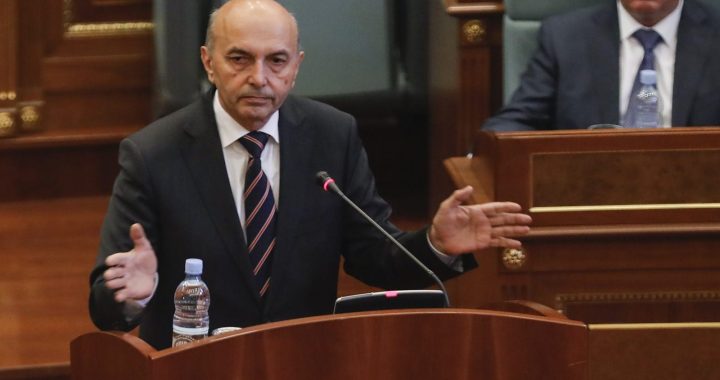

 Isa Mustafa, leader of the Democratic League of Kosovo, LDK, in parliament in 2017. Photo from archives: EPA-EFE/ Valdrin Xhemaj.
Isa Mustafa, leader of the Democratic League of Kosovo, LDK, in parliament in 2017. Photo from archives: EPA-EFE/ Valdrin Xhemaj.
The Democratic League of Kosovo, LDK, has indicated its willingness to form a new government with a range of smaller parties – as soon as it receives a mandate to form an administration from President Thaci.
Isa Mustafa, leader of the former junior partner in government, the Democratic League of Kosovo, LDK, on Tuesday said his party was ready to form a new governing coalition with smaller parties – but will not discuss potential candidates for the post of prime minister before officially receiving a mandate from the President.
“We only have the consent to form a coalition [from the LDK Steering Committee],” Mustafa told a local TV station. He stressed that while his party cannot discuss candidates for prime minister yet, once it has a mandate to form a government, the nomination could follow quickly, “because we have much good staff in the LDK”.
Earlier on Tuesday, the LDK Steering Committee voted in favour of potentially forming a governing coalition with the Alliance for the Future of Kosovo, AAK, led by former prime minister Ramush Haradinaj, the New Kosovo Alliance, AKR, led by former foreign minister Behgjet Pacolli, the Social Democratic Initiative, NISMA, and some ethnic minority communities.
The LDK said 108 members of the Steering Committee had voted in favour of this option, 10 did not vote and six voted against. All three parties were formerly in government with the current biggest opposition party, the Democratic Party of Kosovo, PDK. The LDK and the PDK have both said they will not form a coalition together.
A coalition between the LDK, AAK, AKR, NISMA and minority parties could conceivably take office if President Hashim Thaci gives a mandate to the LDK, as the second-biggest party, to form the government.
However, under the constitution, the president can only give a mandate to the second biggest party in parliament after the first has refused to nominate a candidate for PM.
On April 10, Thaci duly gave the mandate to the Vetevendosje Movement, sending a letter to its leader, the incumbent Prime Minister, Albin Kurti, who lost a no-confidence vote in March.
But three days later Kurti responded by accusing Thaci of “double standards” – on the grounds that previously the country always held snap elections after a government fell in a no-confidence motion.
“This letter is not a refusal to give you a name of a candidate for prime minister,” Kurti insisted in his letter to Thaci. “It is a reminder of the framework of your competencies and constitutional obligations.”
Kurti further called on Thaci to prioritize the health of the nation, just as the government was doing, “leaving aside political games and no longer endangering the lives and health of our citizens”.
His government was toppled by a no-confidence motion initiated by its LDK partners on March 25. As an incumbent government, it now has only certain administrative powers, allowing it to take measures to fight the spread of COVID-19, for example.
Political leaders in Kosovo have been debating the next steps on forming a new government since late March. President Thaci initiated consultative meetings with political leaders to decide the best way forward, which confirmed that all the main parties, except Vetevendosje, were against holding elections during the COVID-19 pandemic, not knowing how long it will last.
In the meantime, although Thaci gave a mandate to Vetevendosje to nominate a new government leader, the party does not have a time limit to accept or decline the invitation.
15 April 2020 - 13:38